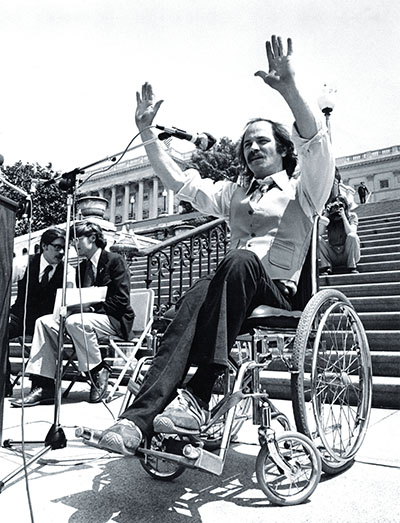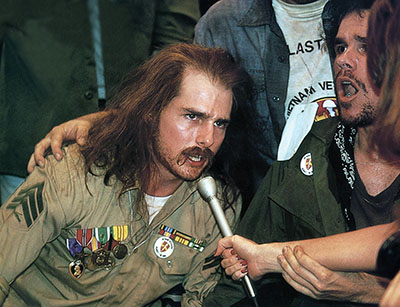
In January 1968, U.S. Marine Ron Kovic was fighting near My Loc, Republic of Vietnam, when an enemy bullet paralyzed him from the chest down. He became one of the war’s best-known opponents. In 1976, the Massapequa, New York, resident published a searing memoir, Born on the Fourth of July. A 1989 film adaptation earned Kovic a Golden Globe for scriptwriting. An advocate for peace and veterans’ causes, he has brought out a 40th-anniversary edition of his memoir and a new book, Hurricane Street, about a hunger strike he and fellow veterans staged in 1974 to protest Veterans Administration lapses. Kovic, 70, lives in Redondo Beach, California.
It’s been 50 years since the Vietnam War began. What are your thoughts?
I’m thankful. I never thought I’d make it to 30. When I got back home to Massapequa, I’d experience terrible anxiety attacks. I’d stick a finger down my throat, trying to puke up that fear. The nightmares are pretty much gone. I’ve had a good woman for nine years. I sleep halfway well, and when I get out of bed and don’t have a bladder infection, that’s a good day. I did have to switch to a power wheelchair, but that’s working out. I was my battalion’s pushup champion; I guess I’m still trying to be that, trying to let people know I can still write, still contribute. I can’t believe I’m still here.
But the anniversary is also a sad time. If there were a Vietnam War wall in Vietnam, how long would it have to be? How many mothers in Vietnam lost sons 40 or 50 years ago and are still mourning?
When I was trying to get Born on the Fourth of July published, no one wanted to hear about the war. Fortunately, there were Vietnam veteran writers like James Webb and John del Vecchio and others like C.D.B. Bryan, and later Oliver Stone with Platoon, and many more. In the ’70s, life for me was an emotional challenge; now it’s more a physical challenge. Other people look at my circumstance and see tragedy; I see good coming from my loss.
How do you look upon your opposition to the war now?
I have no regrets. I’ve been living with what war does physically and emotionally since I was 21 years old. It has made me want to stop another young man or young woman from having to go through what I went through. We need to ask, If those were my children, would I be willing to commit them to conflict? Because the effects of war last a lifetime.
The cost continues long after the battle.
Many guys I knew from the action I write about in Hurricane Street are dead, and the rate of suicide among veterans of Iraq and Afghanistan is very high. I have tried in my books to show that combat doesn’t happen the way John Wayne movies or Rambo movies portray it. I remember my first tour of duty in Vietnam. I was a member of a reconnaissance platoon, doing a long-range patrol. These were 18-man teams, the elite of the Marine Corps. We were in a Huey over Chu Lai, heading into the landing zone, and I was humming the Marine Hymn. I imagined myself being in a movie like Sands of Iwo Jima or Destination Burma or Sergeant York. That’s what I thought war was; that’s what I had grown up on.
What was it like to return home from that first tour?
Resistance to the war offended me. I thought, Here we are, risking our lives the way our fathers did in World War II, and these people are saying that we’re in the wrong. I was wondering if there was going to be a revolution. It made me so mad that I wanted to go back to Vietnam. I volunteered 11 times before they finally let me go. And when I did, in January 1968, I was wounded, which sent me into some dark places. I wrote Born on the Fourth of July as my last will and testament.
What would 70-year-old you say to 18-year-old you?
I’d do everything I could to keep that boy and his friends home. I would respect those who went, but I’d do everything in my power to keep them home.
What would you say today to 38-year-old you?
I’d tell him how proud I am of him for opposing the war. I’d remind him it’s possible to love America and at the same time to criticize America. I’d tell him that he needs to forgive himself, the way I needed to forgive myself, because I took life out of this world. I pulled the trigger.
What have you learned?
That our young men and women are precious. That we need to be more compassionate. Time has left me more willing to listen. War can destroy you, but it also can make you philosophical. I don’t want my life to be about loss.

What would you say to today’s young veterans who are coming to terms with brutal injuries?
I would tell them, “Never, ever give up. You never know how things are going to play out.” Had I given up—and plenty of times I wanted to—I would never have realized that there is another side to my life. You have to fight this thing through in case a day comes when you can say to yourself, thank goodness I didn’t give in. I was wounded on January 20, 1968. That was a really difficult date for me—until 1990. On January 20, 1990, I accepted a Golden Globe for Best Screenplay for the script to Born on the Fourth of July. A day of dread eventually turned into a day of triumph.
What was the high point of your homecoming?
I wasn’t much of a student. To graduate from high school, I had to go to summer school. I was so ashamed of that general diploma. But after I came home, I enrolled at Hofstra University. The campus was so green, the students were so innocent. It was such a relief.
What’s with the VA?
The Department has to reorganize to serve veterans. I was one of the VA’s fiercest critics, but now I look forward to outpatient care there. There has been a cultural change at the Long Beach veterans hospital; I see the possibility of that occurring elsewhere. A passage in Hurricane Street describes the pleasures of the Patriot Café there; it’s comforting to be among my brothers.
Could you back any war?
I went to jail 11 times protesting the Vietnam War, and I opposed the Iraq and Afghan wars. It’s very difficult for me to conceive of a war I’d support. I am living with the emotional and physical consequences of war, and I don’t think that we try hard enough to avoid conflict.
How did Marine buddies react to your politicization?
I wasn’t in touch with buddies from Vietnam afterward, but a friend who was a holder of the Silver Star was very upset with me for speaking out at the Republican convention in 1972. Neighbors told their children to keep away from me. People called me a communist, a traitor. But I wasn’t politicized by the left or the right as much as I was politicized by the battlefield and by the intensive care unit—by the war itself, not by ideology. I was no pacifist, you know. I volunteered for Vietnam twice.
What if you had not been wounded?
I think I still would have opposed the war. My Catholic moral upbringing would have caught up with me. But I wouldn’t have been a leader or had the same passion. And I always respected my fellow soldiers, and I hoped that they would understand. ✯
This story was originally published in the November/December 2016 issue of American History magazine. Subscribe here.





